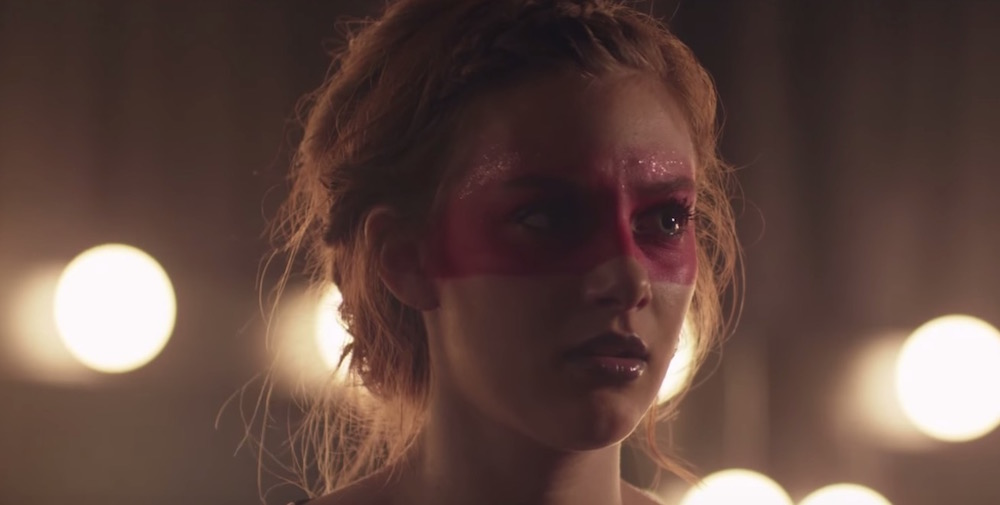
Jem and the Holograms officially had the fourth worst opening of any film released on over 2000 screens, topped only by such fabled flops as Delgo, The Oogieloves in the Big Balloon Adventure, and the 10th anniversary Saw theatrical re-release. In just a short number of days, it surpassed history and entered legend, doing so poorly that it was literally pulled from theaters, an unprecedented move for a major film release. Of the three original release films in this incredible clubhouse, it was also the only one released by a major studio, not a little-known and poorly promoted independent debacle,but a heavily marketed and totally public failure. A tiny budget (for Hollywood standards) of five million wasn’t even recouped by a run so awful that even the worst predictions for it fell astoundingly short. I own multiple full sized theatrical posters for The Oogieloves, and not because of the film’s quality, so my reasoning for so desperately wanting to see Jem should be obvious. And I have to say, I was shocked, but not for the reasons I was expecting going in; I was shocked because this now canonical flop is not only pretty good, it’s simply one of the best films to come out in 2015.
Following Aubrey Peeples as Jerrica (soon to be Jem), the film tracks both her rise to stardom in a band with her three sisters, one biological, two foster. Their mother is played by the ever-wonderful Molly Ringwald, and their manager is played by the delightfully evil Juliette Lewis, who absolutely kills it in what is positively the most fun I’ve seen her have in a film. Starting as a youtube viral sensation, Jem soon makes her way into the vaunted halls of music movie fame with nothing but pluck, determination, and friendship to guide her, not to mention a preternatural musical talent that allows every instrument she picks up to sound like it was professionally recorded in an expensive studio, even a resonator guitar with a removable back that contains pieces to a robot (more on that later). Rio, the music industry intern tasked with keeping an eye on them, eventually joins the spunky foursome on a city-wide scavenger hunt set up by Jem’s dead father, and through a series of quickly resolved problems all (spoiler alert) ends well.
This plot is nuts. Ostensibly starting in what we believe to be a movie version of the real world, we quickly come to find that this universe is a fantasy construction, what with the robot constructed by a dying parent to the acapella singing so blatantly dubbed in afterwards that it becomes surreal to a nebulous deus-ex-machina last will and testament made by Rio’s dead father (there are so many dead parents in this movie guys) to the band Valet of the Damned. It’s an absurd adventure with very few stakes and even quicker resolutions that features, very prominently, lo-fi video taken directly from YouTube, created by fans of the original Jem and the Holograms cartoon series. From the wrong angle, it’s a real mess, a jumble of nonsensical plotlines and hammy jokes strung together by glorified music videos and found-art avant-gardism, shot with both hand-camera close-up intimacy and big-screen ready Deakins-eqsue majesty (assuming Roger Deakins would be up for shooting primarily in neon light). If you’re so inclined to pick it apart, it folds easily to you, the seams showing clearly and making it quite simple to unravel the whole thing.
But at some point, we have to give ourselves over the the majesty of a film, and Jem and the Holograms is really and truly something uniquely magical. Recalling very clearly feature-length musical advertisements like Justin Beiber’s Never Say Never (directed, not coincidentally, by Jon M. Chu, the same man behind the camera here) and Katy Perry’s Part of Me, it seeks to express the ecstasy, the elation, the far-reaching joy of supposedly disposable pop music. At its best moments (the concerts, a scene set underwater at night, a touching monologue from a dead father delivered by a sentient robot), Jem touches the sublimity of hearing that right song at the right time, the moment the disposable lifts you up, the moment it might have saved your life that night. It is absolutely packed with indescribably beautiful images, but they’re also images that, if you’re not into the disposable (self professed huge Katy fan here), might seem saccharine, reaching, or shallow. Sometimes, a shitty pop song really does make a difference, and sometimes it can be hard to see why from the outside. At least, I’m assuming that’s the cause behind the toxic reviews Jem has gotten, because otherwise this profession of film criticism is filled with joyless churls (to be safe, let’s say it’s both of those things).
Identity is the main concern of the film, much like another outstanding picture from this year, The Visit. Where that film addressed the presentation of the self to family, Jem focuses on the presentation of the self to everyone, social media heavily, heavily included. The internet has fragmented identity in a way never before seen, the ease and availability of self-contained communities making a central “self” less and less clear. Who you are on Twitter versus who you are on Tumblr versus who you are on some forum for people really into Fraggle Rock is vastly different, even when you’re presenting yourself to the same people. The changing, malleable formats of expression require this. As we feel like we become different people in different places, as the amount of people we have to be is constantly growing, it can be hard to know a central “you”, an inseparable, unbreakable thing that you were all along. Jerrica struggles with this precisely, articulating as much in her opening webcam monologue and then not knowing how to deal with Jem, the musical persona she created specifically so she wouldn’t have to be the one in the spotlight. She fights with this identity throughout, and her peace only comes from an observation of the people around her; she is Jem, and Jem is everyone else, and she is someone else, and they’re all part of the same thing. Social media’s reconciliation with identity must come from this epiphany: all the selves are you, and who you are can be splintered and strange and contradictory, and there is no center. You are an evolving piece of art, you are an expanding presence, you are something that has no one definition, but you are still, without bounds, you.
I’ve seen criticism leveled at Jem for having rose-colored lenses towards social media, but this is precisely the point. If everyone on the internet stopped removing themselves from their actions, when these stop being particular fragmented identities and personas and become part of the roiling singular self, then the cruelty of the internet becomes harder. It becomes more difficult to accomplish your worst impulses when you can see the ripples course through you. If that person sending death threats to a female journalist couldn’t separate that part of them from who they are to their mom on Facebook, they wouldn’t do it (or, at least, they’d be ostracized if they were the type of person who did). A human being is not a vacuum, not sterile or contained within a body; when we die, we live through other people’s memories (or, in Jem and the Holograms, through sentient robots we built before we died). The “us” that we know belongs piecemeal to everyone we’ve encountered, and all of them belong piecemeal to us. You are not “you” alone; you are a memory, a persona living in everyone you’ve met. The best and worst part of the internet is that it lets us try out different parts of ourselves without having to be public about it. We get trial periods in who we are without having to be ashamed. What Jem is calling for is not the end of this, but the end of the callousness and an understanding of a kind of symbiotic life, a biome-sized organism rippling with generosity and kindness if only we could see the big picture.
Put more simply: Jem and the Holograms argues that social media is just an advancement of an age-old problem, but because it is so much larger than we could have ever imagined, it holds hope for us to find unifying experiences: the shattered glass coming back together, rippling in the massiveness of time. Not that it would say as much; hilarious, heartwarming, and beautiful, it is most certainly a crowd pleaser, not the intellectual exercise I might be painting it as. It’s a blast, front to back entertainment of the highest order that trips the light fantastic with the best of them. I laughed, I got misty-eyed, I was damn near close to fist-pumping more than a few times. This is not a failure by any means, this is an advancement of the form of the popular film, a movie willing to embrace the parts of teen girls’ culture others would consider frivolous while managing to not talk down to its target audience. It takes those feelings seriously, because it understands that what looks silly and pointless to some is anything but to the young girls and boys who see something of themselves in Jem, and who tearfully consider her platitudes to be life-affirming, life-changing. “Be yourself” might be a cliché message, but what Jem does right is to know that there’s unequivocal beauty in the cliché. Jem is a celebration of the shallow, but it points out how deep that really is, how multi-faceted and incredible the emotions we try and step away from really are. It’s an easy punching bag, but it doesn’t care; Jem and the Holograms will find some sort of rare grace, whether you want it to or not.
—
Directed by Jon M. Chu; written by Ryan Landels; starring Aubrey Peeples, Stefanie Scott, Aurora Perrineau, Hayley Kiyoko, Ryan Guzman, Molly Ringwald, and Juliette Lewis; 118 minutes.
Jem and the Holograms is currently available on DVD and Blu-Ray.



 Derek
Derek
 Isabelle
Isabelle